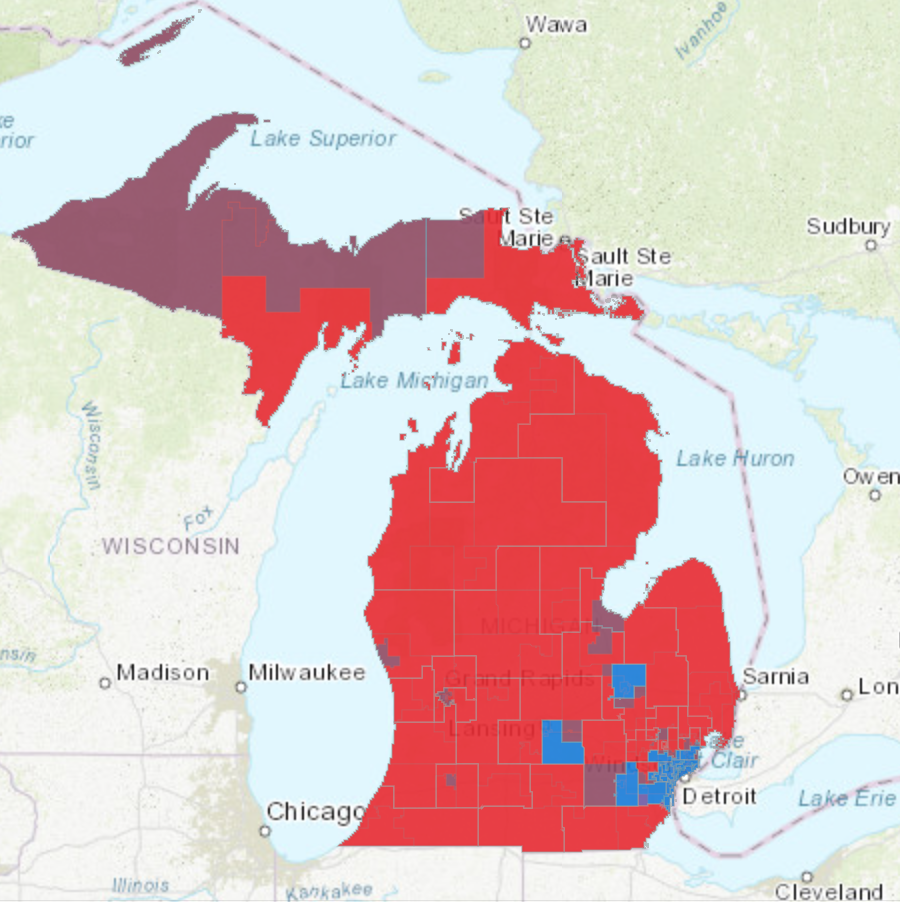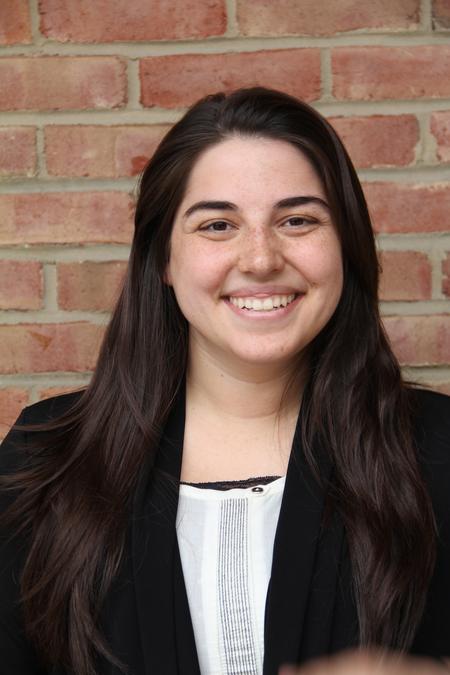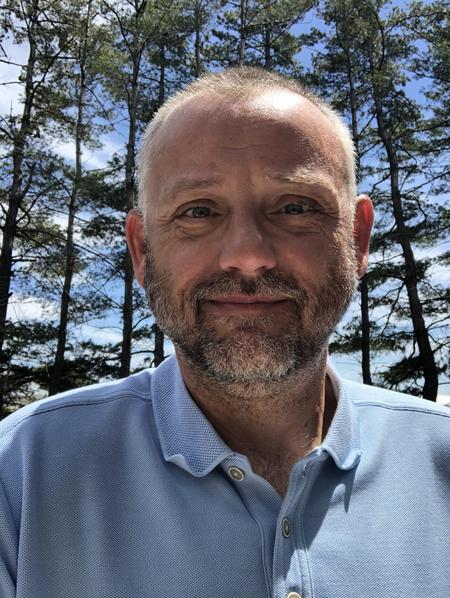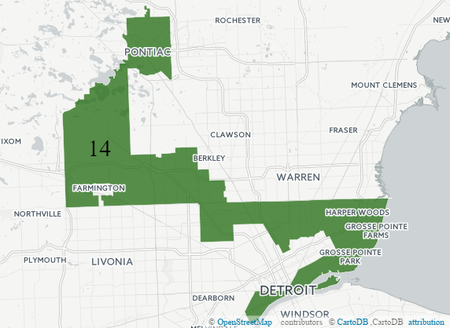Who Should Draw Michigan’s Political Maps? Voters May Decide [PHOTOS + MAP]
A proposal to change redistricting heads to the ballot, but still faces legal challenge.

A state elections board certified a petition to change the method of setting the boundaries for Michigan’s congressional and state legislative districts. Right now, the legislature sets the boundaries, not only for its own districts but for U.S. House seats as well.
But Katie Fahey says that needs to change. She leads a group called Voters Not Politicians.
“We believe that voters should be choosing who their politicians are instead of politicians choosing who their voters are.”–Katie Fahey, Voters Not Politicians
“Right now, in the current redistricting process, you have politicians that are looking out for themselves, working with lobbyists who are picking and choosing who they want their voters to be, when really our democracy is based on our own representation and being able to elect that ourselves,” Fahey says.

Fahey and her group started a petition drive to create an independent redistricting commission. They gathered more than 400,000 signatures to put the issue on the November ballot. Fahey says the proposal would create a fairer and more transparent method of drawing political boundaries. She says allowing lawmakers to create their own districts makes elections less competitive, and politicians less accountable for things like roads, water, and education.
“Those are some really basic things that our government provides,” Fahey says. “And how that relates to redistricting is I think our politicians are not accountable to us because they’re not afraid of being unelected.”
The commission Fahey envisions would have four Democrats, four Republicans, and five independents chosen at random by the Secretary of State. The goal is to have a panel—and a map—that more accurately reflects Michigan’s electorate, which was split almost evenly in 2016. President Trump won the state by less than 11,000 votes. And neither party won a majority of the combined votes cast in U.S. or state House races. Yet Republicans have firm control of Michigan’s congressional delegation and the Legislature. If gerrymandering doesn’t explain that, what does? Republican political consultant Jamie Roe says the answer is geography.

“Democrats tend to group in certain geographic areas—university towns, big cities, etc,” Roe says. “Republicans are more evenly split across the state. So because we draw our districts based on geography, that is one reason you have those disparities.”
Roe is the co-founder of Grand River Strategies, which works with Republican candidates. He has also worked with the GOP in previous redistricting cycles. Roe says the law requires the legislature to keep communities whole as much as possible when drawing district maps. He also pushes back against critics who use Michigan’s 14th Congressional District as a prime example of “packing and cracking”. That’s when members of one voting bloc are lumped into fewer districts, ensuring the other side wins more seats. The 14th District includes parts of Detroit, the Grosse Pointes, southern Oakland County, and Pontiac. Both the 14th and 13th districts are predominantly African-American. Roe says their boundaries are governed by federal law.
“The federal Voting Rights Act, when it was passed in 1964, required if you can build majority-minority districts–and in this case, two majority African-American districts, which Detroit has had since the advent of the Voting Rights Act–then you must build two African-American majority districts.”–Jamie Roe.

Roe says the Voters Not Politicians proposal could mean less African-American representation in Washington and Lansing.
Fahey says that’s not true—it requires adherence to the Voting Rights Act and keeps communities whole as much as possible. She says researchers have drawn thousands of maps that follow federal and state redistricting standards and don’t give one party a lopsided majority in either Capitol.
The Board of State Canvassers certified the Voters Not Politicians proposal after the Michigan Court of Appeals ruled that it must be on the ballot. Opponents, including the Michigan Chamber of Commerce and a group called Citizens Protecting Michigan’s Constitution, have appealed to the Michigan Supreme Court. Unless justices rule otherwise, the proposal will appear on the November ballot.
MORE FROM WDET AND BRIDGE MAGAZINE:
Voters Not Politicians: The Pros
Voters Not Politicians: The Cons
How “Red” or “Blue” Are Michigan’s Political Maps and Election Results?
BRIDGE: Michigan Justices Backed By Opponents of Redistricting Proposal May Decide Its Fate
Voters Not Politicians Proposal by WDET 101.9 FM on Scribd
Here’s other WDET work on the gerrymandering issue:
Policy Meets the People: Introducing the Issue of Gerrymandering
Talk Show Programming
WATCH HERE: A live one-hour show with an in-studio audience and guests at 8 p.m., Tuesday, June 26. Tune in at 101.9 FM or online at WDET.org. Or join on WDET’s Facebook page where we’ll live stream the show. The show rebroadcasts at 2 p.m. Tuesday, July 3. Listen HERE for WDET 101.9 FM live online.
On DETROIT TODAY: Was Racism Involved in the Drawing of Michigan’s Congressional Districts?
Digital Specials
A Podcast Playlist – Become a Gerrymandering Expert Just By Listening
NPR’s Hidden Brain: Gerrymandering and You
News Coverage
MichMash: Here’s How You Can Influence The Drawing of District Lines in Michigan
Gerrymandering: Why It’s a Technology Issue [TRANSCRIPT]
Redistricting 101: Your District, Your Politicians, But Does Your Vote Matter?
Ohio Offers Its Own Solution to Gerrymandering [MAPS + GRAPHS]
Who Should Draw Michigan’s Political Maps? Voters May Decide [PHOTOS + MAP]
Voters Not Politicians: The Pros [TRANSCRIPT]
Voters Not Politicians: The Cons [TRANSCRIPT]
It’s a Ship….No, it’s a House…Wait, it’s a Congressional District?
Does Michigan Have a District that Looks Like Homer Simpson? You Be the Judge.

